Charles E W Bean, Diaries, AWM38 3DRL 606/199/1 - August - November 1918 - Part 3
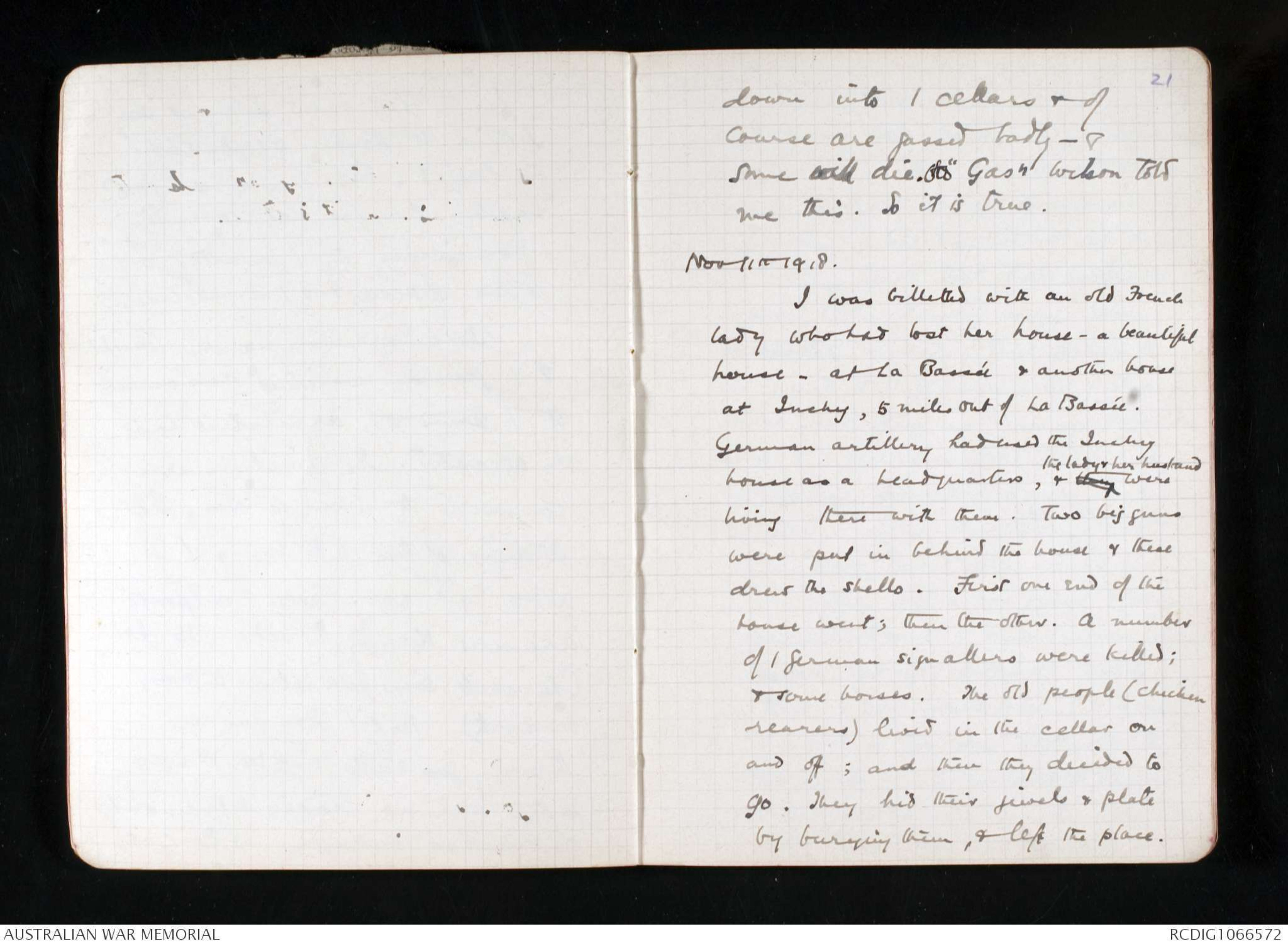
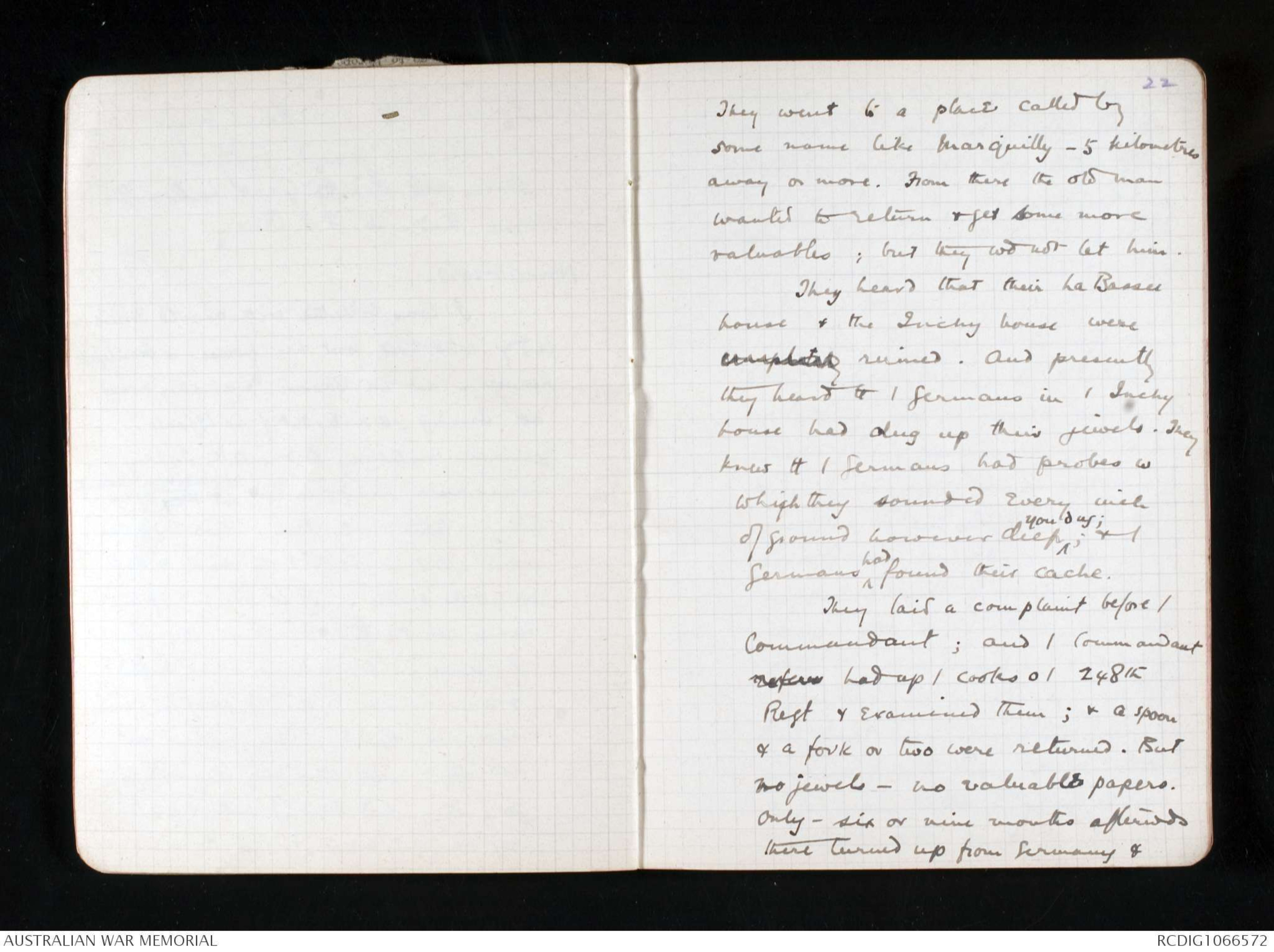
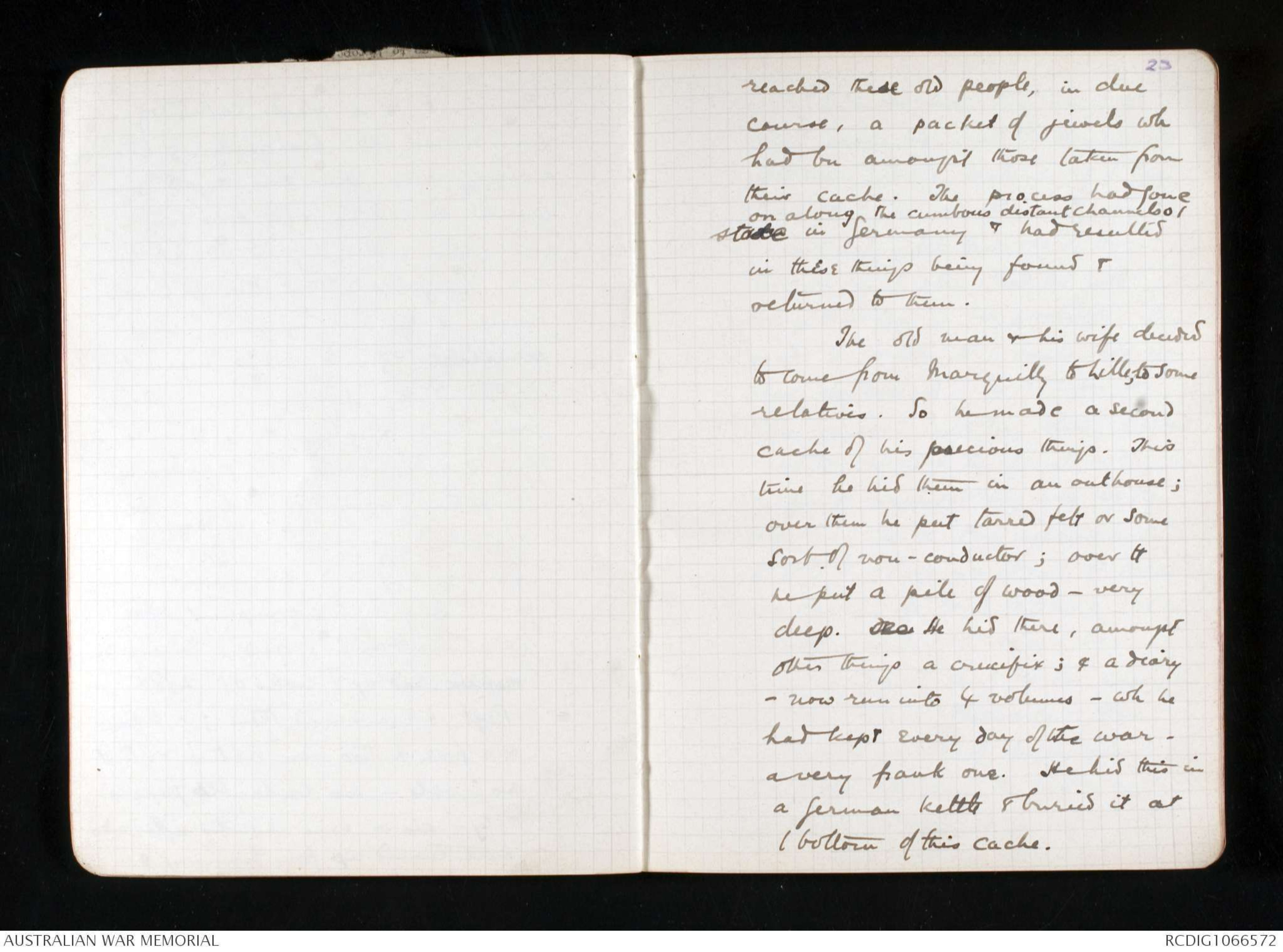
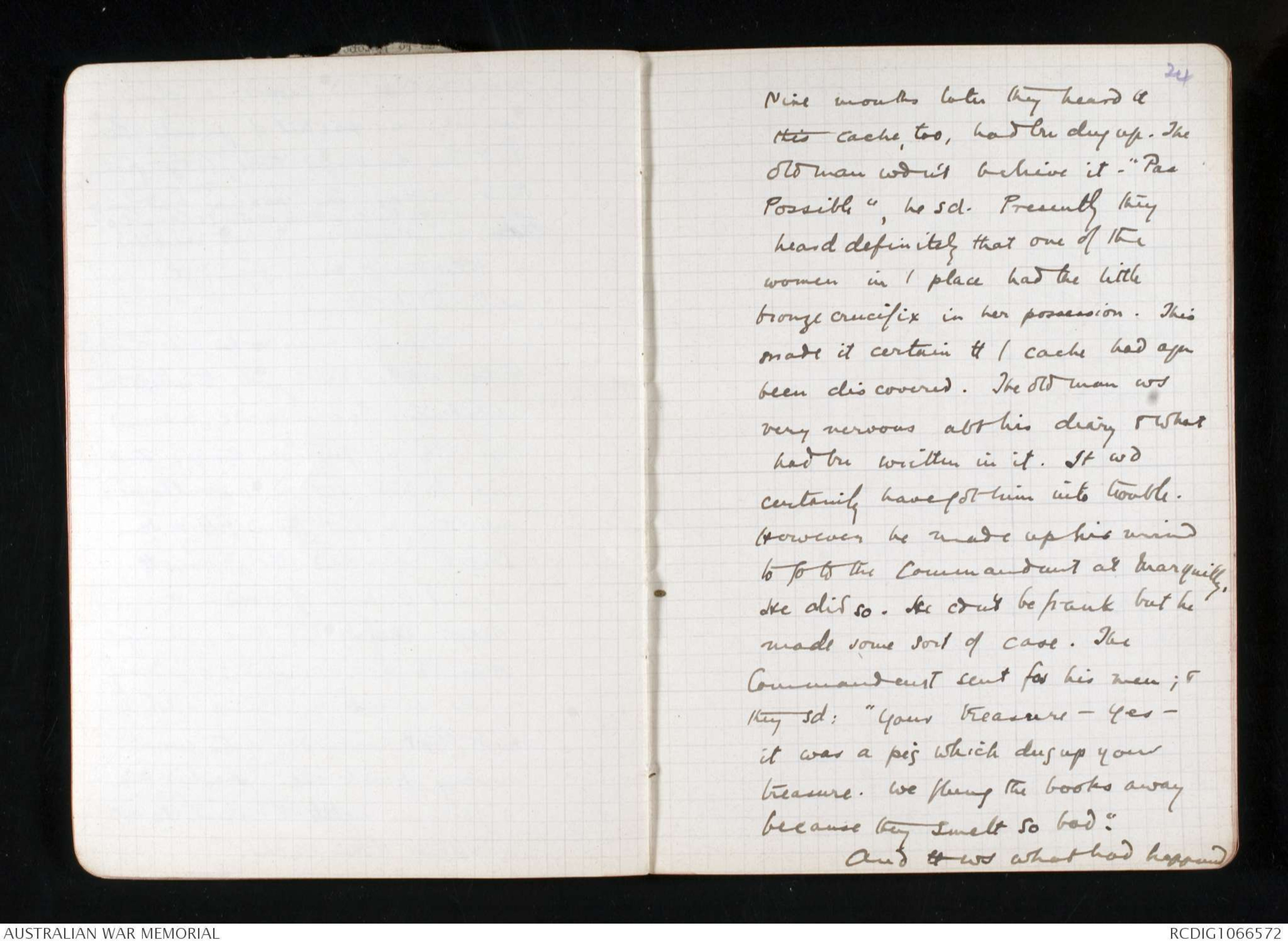
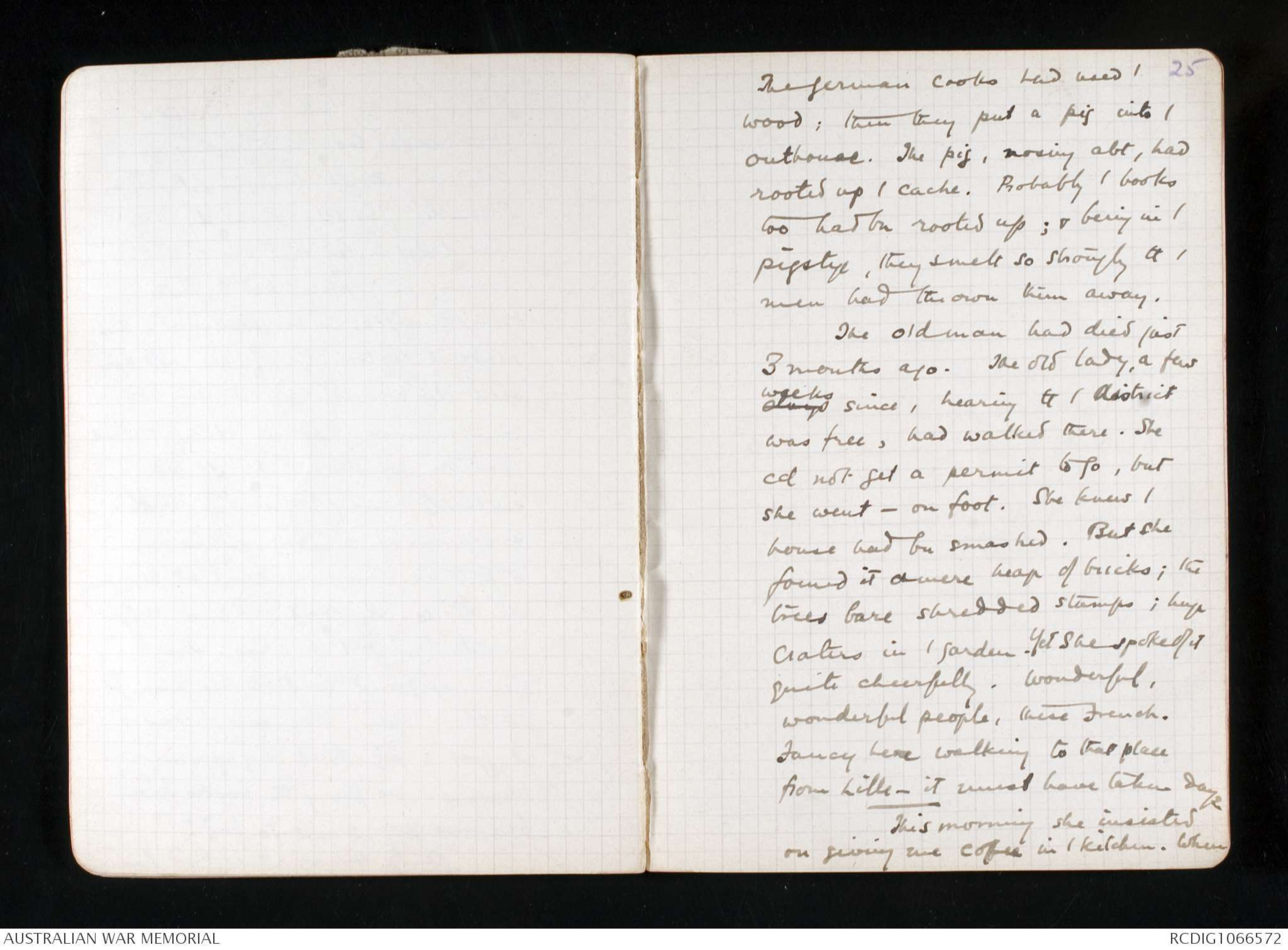
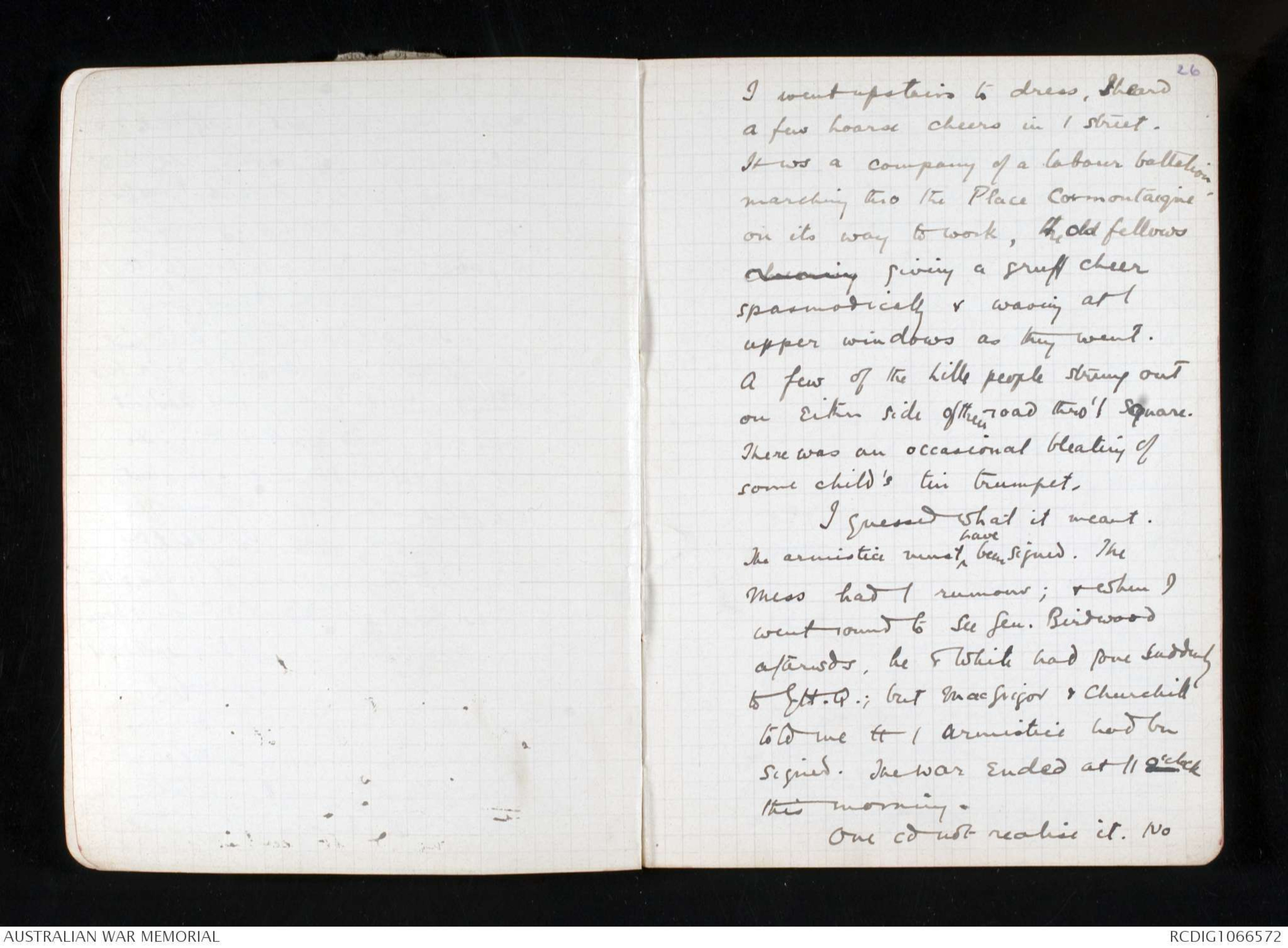
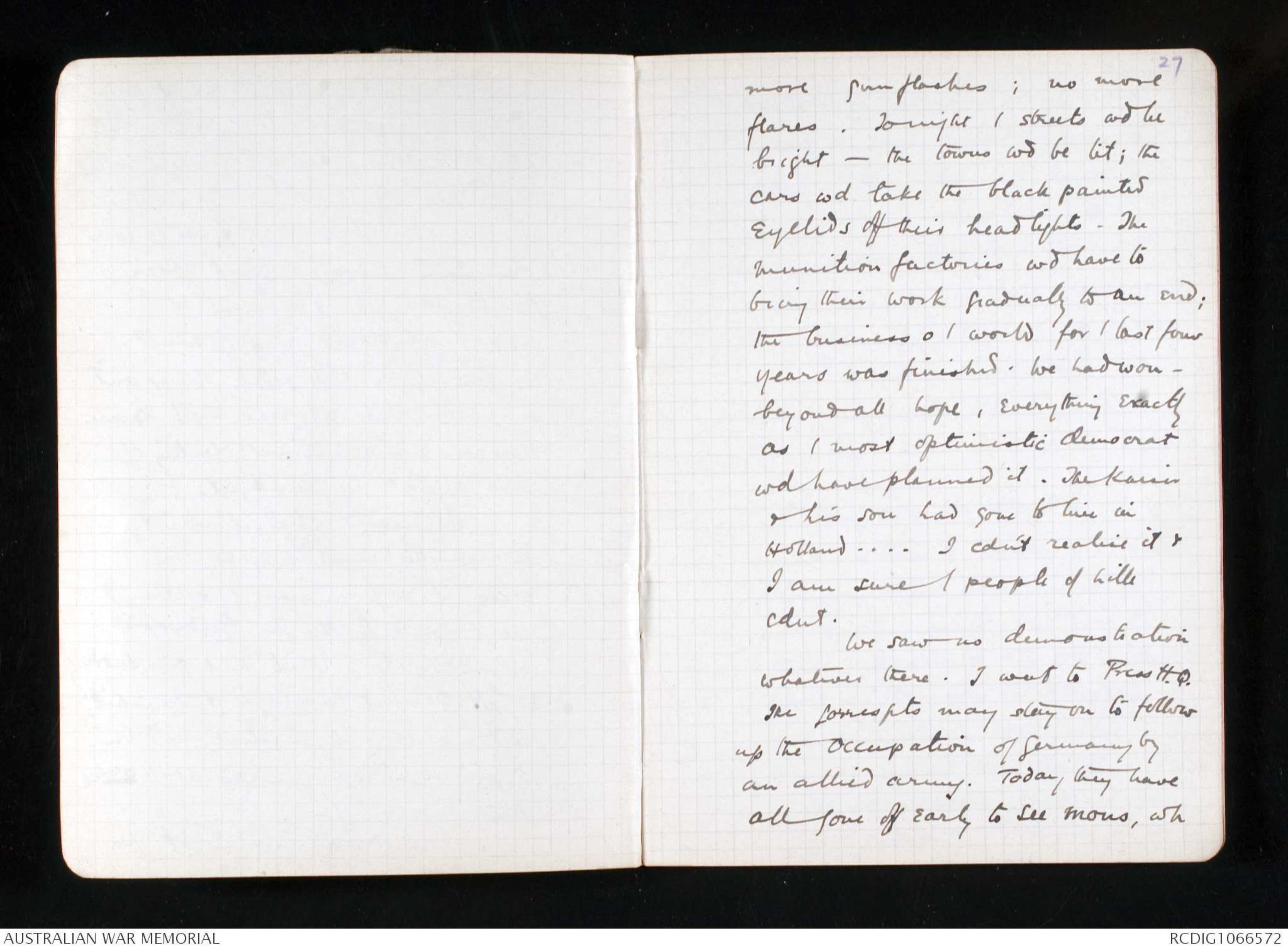
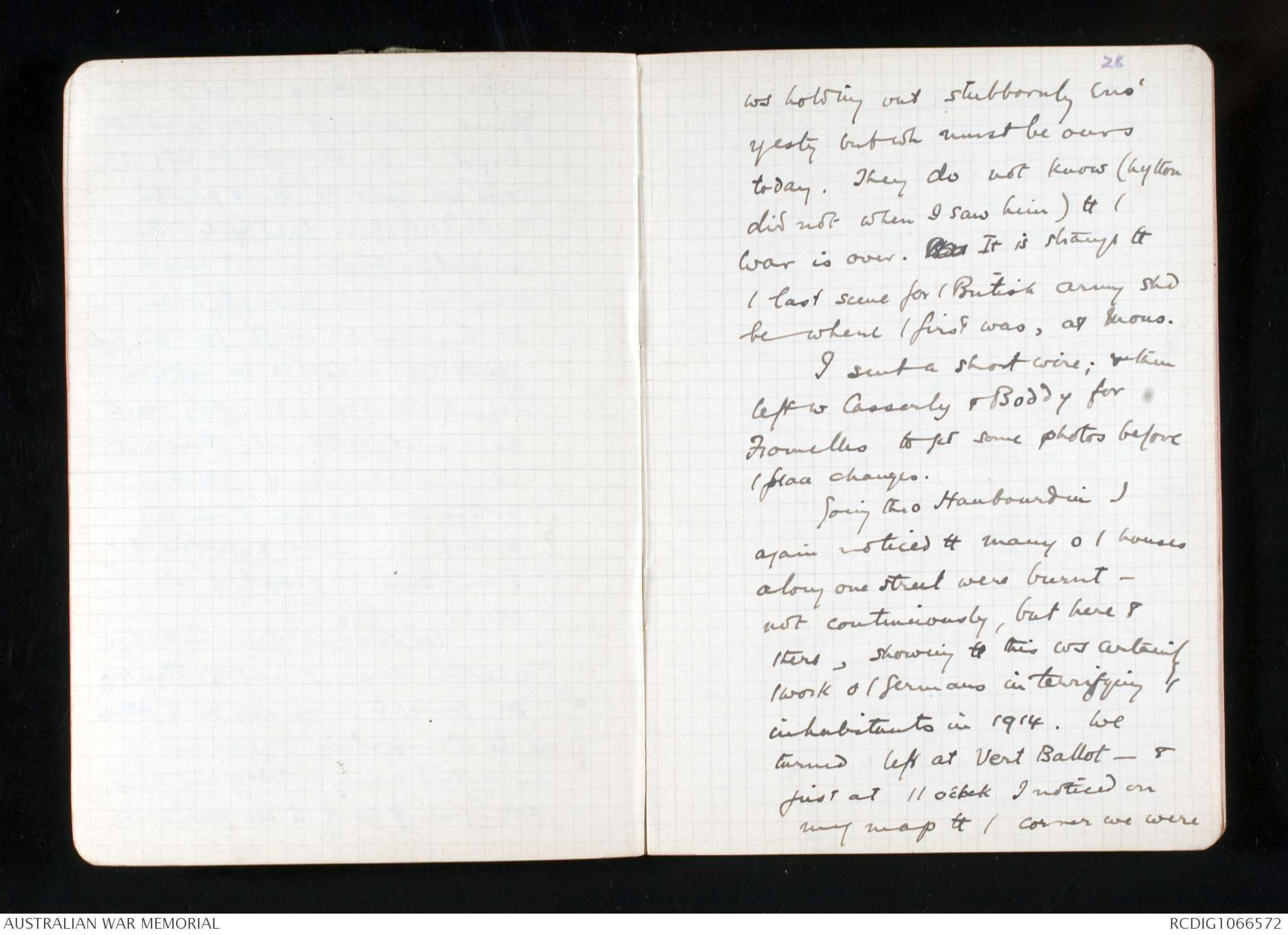
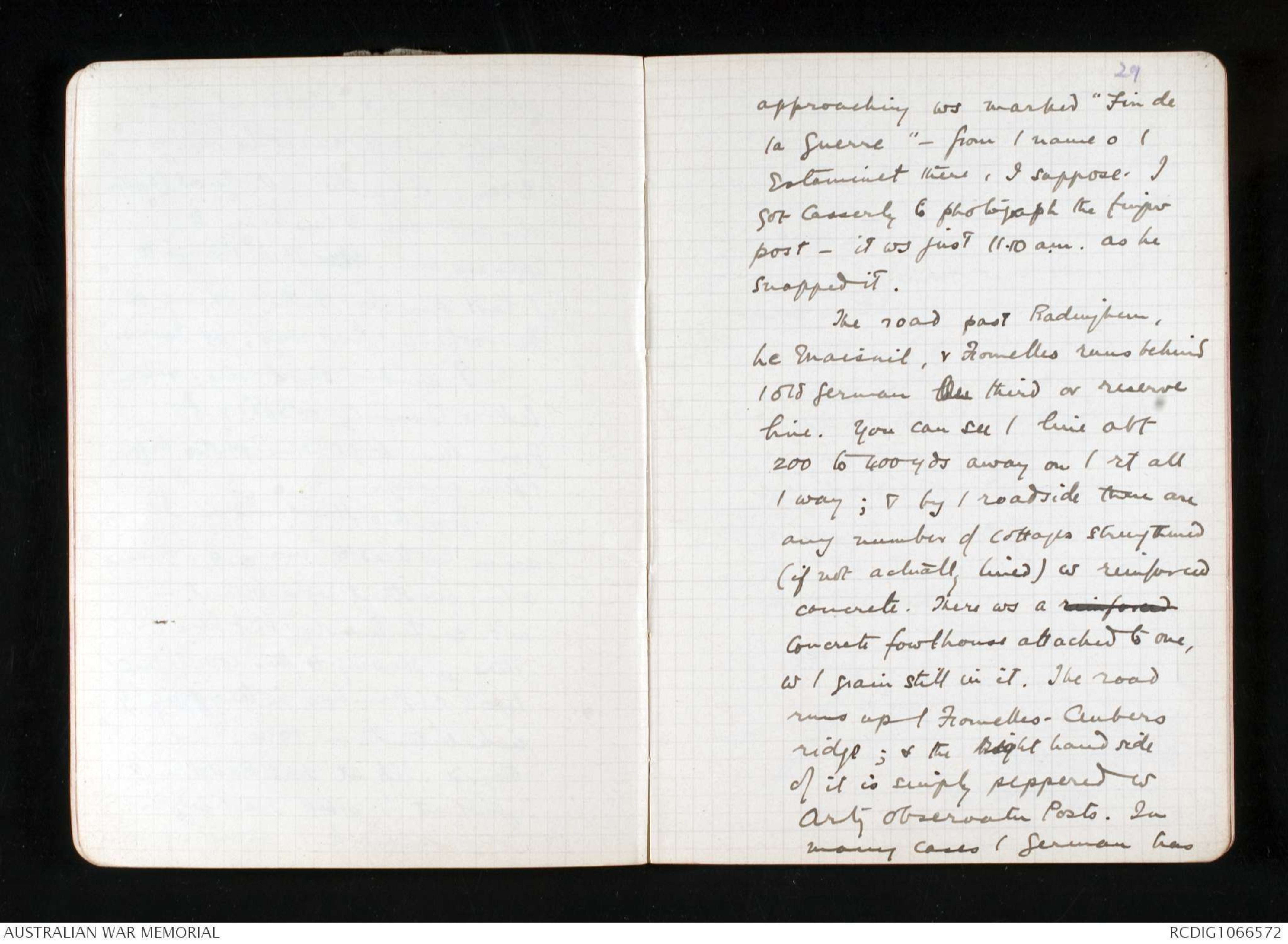
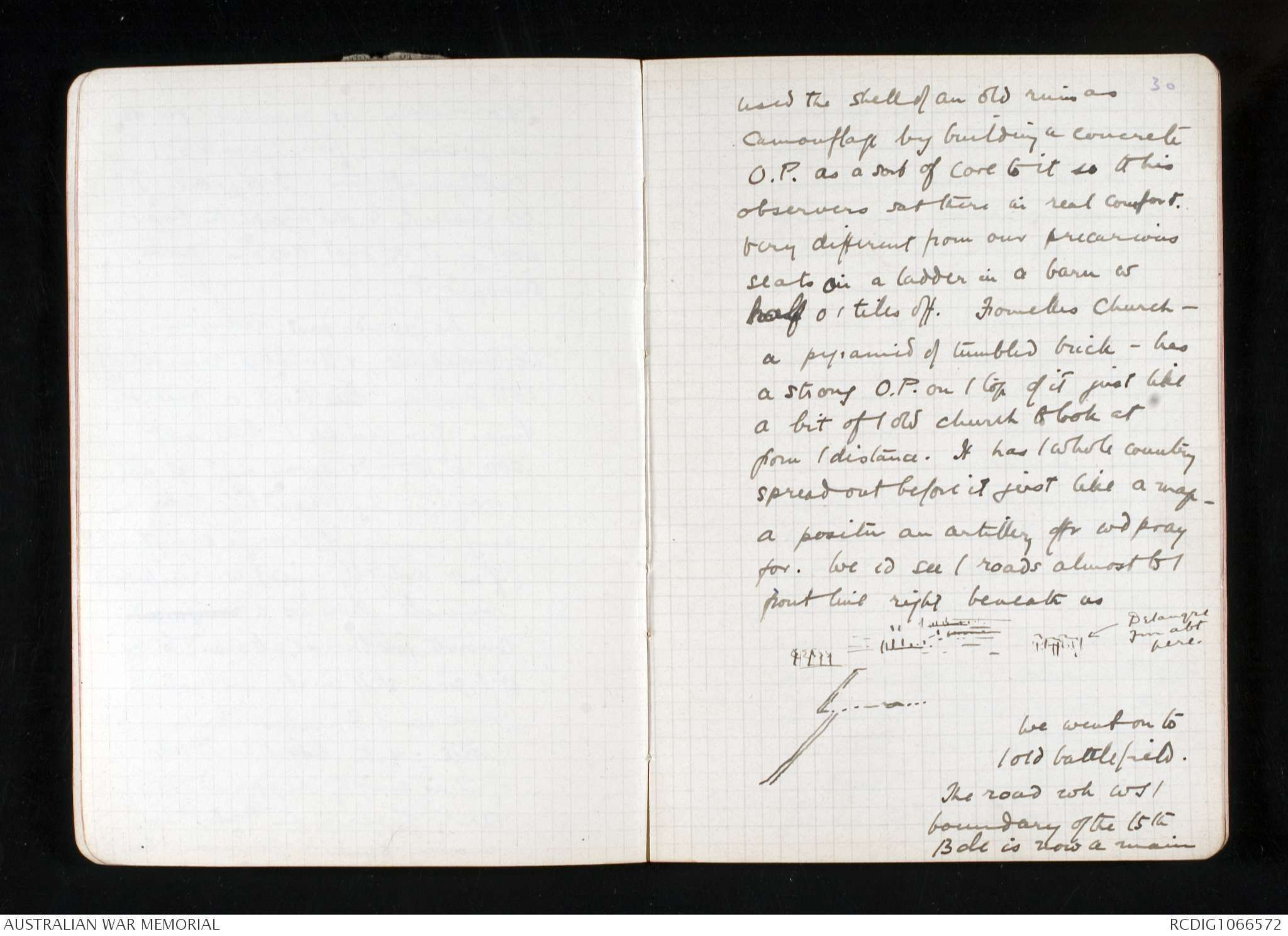
21
down into / cellars & of
course are gassed badly - &
some will die. Old "Gas" Wilson told
me this. So it is true.
Nov 11th 1918.
I was billetted with an old French
lady who had lost her house - a beautiful
house - at La Bassee & another house
at Inchy, 5 miles out of La Bassee.
German artillery had used the Inchy
house as a headquarters, & ^the lady her husband were
living there with them. Two big guns
were put in behind the house & these
drew the shells. First one end of the
house went; then the other. A number
o / German signallers were killed;
& some horses. The old people (chicken
rearers) lived in the cellar on
and off; and then they decided to
go. They hid their jewels & plate
by burying them, & left the place.
22
They went to a place called by
some name like Marquilly - 5 kilometres
away or more. From there the old man
wanted to return & get some more
valuables; but they wd not let him.
They heard that their La Bassee
house & the Inchy house werecompletely ruined. And presently
they heard tt / Germans in / Inchy
house had dug up their jewels. They
knew tt / Germans, had probes w
which they sounded every inch
o ground however deep ^you dug; & /
Germans ^had found their cache.
They laid a complaint before /
Commandant; and / Commandantefer had up / cooks o / 248th
Regt & examined them; & a spoon
& a fork or two were returned. But
no jewels - no valuable papers.
Only - six or nine months afterwds
there turned up from Germany &
23
reached these old people, in due
course, a packet of jewels wh
had bn amongst those taken from
their cache. The process had gone
on along, the cumbrus distant channels of /
state in Germany & had resulted
in these things being found &
returned to them.
The old man & his wife decided
to come from Marquilly to Lille, to some
relatives. So he made a second
cache of his precious things. This
time he hid them in an outhouse;
over them he put tarred felt or some
sort of non-conductor; over tt
he put a pile of wood - very
deep. xxx He hid there, amongst
other things a crucifix; & a diary
- now run into 4 volumes - wh he
had kept every day of the war -
a very frank one. He hid this in
a German kettle & buried it at
/ bottom of this cache.
24
Nine months later they heard tt
this cache, too, had bn dug up. The
old man wdn't believe it. "Pas
Possible", he sd. Presently they
heard definitely that one of the
women in / place had the little
bronze crucifix in her possession. This
made it certain tt / cache had agn
been discovered. The old man ws
very nervous abt his diary & what
had bn written in it. It wd
certainly have got him into trouble.
However he made up his mind
to go to the Commandant at Marquilly.
He did so. He cdn't be frank but he
made some sort of case. The
Commandment sent for his men; &
they sd: " Your treasure - Yes -
it was a pig which dug up your
treasure. We flung the books away
because they smelt so bad."
And tt ws what had happened.
25
The German cooks had used /
wood; then they put a pig into /
outhouse. The pig, nosing abt, had
rooted up / cache. Probably / books
too had bn rooted up; & being in /
pig stye, they smelt so strongly tt /
men had thrown them away.
The old man had died just
3 months ago. The old lady, a fewdays weeks since, hearing tt / district
was free, had walked there. She
cd not get a permit to go, but
she went - on foot. She knew /
house had bn smashed. But she
found it a mere heap of bricks; the
trees bare shredded stumps; huge
craters in / garden. Yet she spoke of it
quite cheerfully. Wonderful,
wonderful people, these French.
Fancy her walking to that place
from Lille - it must have taken days.
This morning she insisted
on giving me coffee in / kitchen. When
26
I went upstairs to dress, I heard
a few hoarse cheers in / street.
It ws a company of a labour battalion
marching thro the Place Cormontaigne
on its way to work, the old fellowsxxxxx giving a gruff cheer
spasmodically & waving at /
upper windows as they went.
A few of the Lille people strung out
on either side of their road thro' / square.
There was an occasional bleating of
some child's tin trumpet.
I guessed what it meant.
The armistice must ^have been signed. The
mess had / rumour; & when I
went round to see Gen. Birdwood
afterwds, he & White had gone suddenly
to G.H.Q.; but Macgrigor & Churchill
told me tt / Armistice had bn
signed. The war ended at 11 xxx o'clock
this morning.
One cd not realise it. No
27
more gun flashes; no more
flares. Tonight / streets wd be
bright – the towns wd be lit; the
cars wd take the black painted
eyelids off their headlights. The
munition factories wd have to
bring their work gradually to an end;
the business o / world for / last four
years was finished. We had won -
beyond all hope, everything exactly
as / most optimistic democrat
wd have planned it. The Kaiser
& his son had gone to live in
Holland. . . . I cdn't realise it &
I am sure / people of Lille
cdnt.
We saw no demonstration
whatever there. I went to Press H.Q.
The correspts may stay on to follow
up the occupation of Germany by
an allied army. Today they have
all gone off early to see Mons, wh
28
ws holding out stubbornly eno'
yesty but wh must be ours
today. They do not know (Lytton
did not when I saw him) tt /
war is over. xxx It is strange tt
/ last scene for / British army shd
be where I first was, at Mons.
I sent a short wire; & then
left w Casserly & Boddy for
Fromelles to get some photos before
/ place changes.
Going thro Hanbourdin we
again noticed tt many of / houses
along one street were burnt -
not continuously, but here &
there, showing tt this ws certainly
/ work o / Germans in terrifying /
inhabitants in 1914. We
turned left at Vert Ballot - &
just at 11 o'clock I noticed on
my map tt / corner we were
29
approaching ws marked "Fin de
1a Guerre" - from / name o /
estaminet there, I suppose. I
got Casserly to photograph the finger
post - it ws just 11.10 am. as he
snapped it.
The road past Radinghem
Le Maisnil, & Fromelles runs behind
/ old German tee third or reserve
line. You can see / line abt
200 to 400 yds away on / rt all
/ way; & by / roadside there are
any number of cottages strengthened
(if not actually lined) w reinforced
concrete. There ws a reinforced
concrete fowl house attached to one,
w / grain still in it. The road
runs up / Fromelles-Ceubers
ridge; & the right hand side
of it is simply peppered In
Arty observatn Posts. In
many cases / German has
30
used the shell of an old ruin as
camouflage by building a concrete
O.P. as a sort of cave to it so tt his
observers sat there in real comfort.
Very different from our precarious
seats on a ladder in a barn w
half o / tiles off. Fromelles Church -
a pyramid of tumbled brick - has
a strong O.P. on / top of it just like
a bit of / old church to look at
from / distance. It has / whole country
spread out before it just like a map -
a positn an artillery offr wd pray
for. We cd see / roads almost to /
front line right beneath us
Hand drawn diagram – see original
We went on to
/ old battlefield.
The road wh ws /
boundary of the 15th
Bde is now a main
 Deb Parkinson
Deb ParkinsonThis transcription item is now locked to you for editing. To release the lock either Save your changes or Cancel.
This lock will be automatically released after 60 minutes of inactivity.